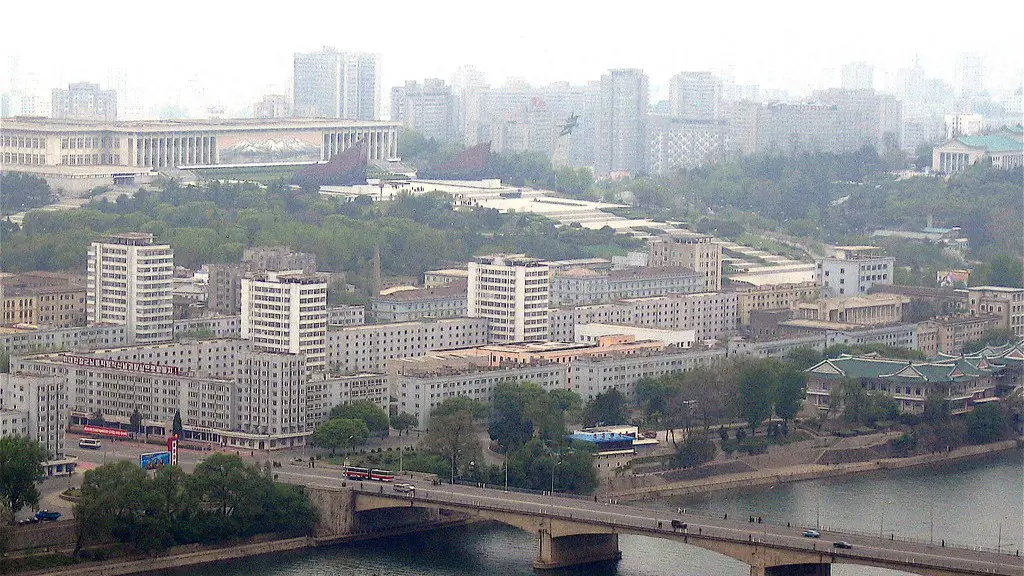North Korea has been making threats against the US for decades. In the early 1950s, North Korea, along with its allies China and the USSR, made threats of invasion against South Korea, which is a US ally. Since then, the threat of war between the two countries has been a persistent theme. However, in recent years, the situation has taken a more serious turn, as North Korea has been increasing its nuclear capabilities and making explicit threats to use them against the US.
The US has long had an antagonistic relationship with North Korea due to the nation’s persistent refusal to end its nuclear program and its refusal to accept US military presence in the region. Despite US attempts to negotiate with the North Korean government, little has been achieved since the signing of the armistice in 1953. This has led to increased tensions between the two countries and fears that North Korea may be preparing for war.
One of the most notable threats that North Korea has made against the US was in August 2017, when North Korean leader Kim Jong-Un warned that he was considering attacking the US territory of Guam. This was met with a stern warning from the US President Donald Trump, which was seen as a sign that the US was taking the threat seriously. Since then, North Korea has largely backed away from its aggressive posturing, although it still retains its nuclear capabilities.
The US has responded to North Korea’s threatening behavior by imposing tough economic sanctions and diplomatic pressure. These measures have had limited success in thwarting North Korea’s nuclear aspirations, as the country continues to build up its arsenal and pose a potential threat to the region. At the same time, the US has sought to use diplomacy to try and bring North Korea to the negotiating table and discuss a resolution that would bring peace to the region.
However, the prospects for peace remain uncertain, as North Korea has continued to resist talks and its nuclear capabilities are still growing. It is possible that North Korea may attempt to use its nuclear weapons as a bargaining chip to gain concessions from the US and other nations, or it may simply be trying to assert its power and authority in the region. As long as North Korea continues to act aggressively, there will always be the danger of conflict.
International Reactions
North Korea’s threats against the US have led to international alarm and condemnation. The United Nations Security Council has passed a number of resolutions condemning North Korea’s actions and imposing economic sanctions in the hope of bringing it to the negotiating table. These measures, however, have done little to deter North Korea from its aggressive stance.
Most countries in the region, including South Korea and Japan, have stepped up their efforts to defend themselves against potential North Korean threats. South Korea has developed an advanced missile defense system and is also working to build up its conventional military forces. Meanwhile, Japan has increased its defense spending and is looking to build closer ties with the US to provide mutual defense.
The US has also sought to build a more effective regional security architecture that would enable it to respond swiftly and decisively to any North Korean aggression. It has bolstered its military presence in the region and engaged in joint military exercises with its regional allies. At the same time, the US has also looked to strengthen its diplomatic and economic ties with partners in the region, in the hope of finding a peaceful resolution to the conflict.
Economic Impact
The constant threat of conflict between North Korea and the US has had a significant negative effect on the global economy. Many companies doing business in the region have been forced to relocate or reduce their operations due to the increasingly hostile environment. At the same time, the uncertainty of the situation has caused many investors to opt out of investing in the region.
Furthermore, the international economic sanctions that have been imposed on North Korea have further aggravated the situation. The sanctions have led to a significant drop in North Korea’s revenue, putting additional strain on its already-fragile economy. This, in turn, has limited North Korea’s ability to fund its nuclear weapons program, but it has also led to increased suffering among its citizens, who are already living in poverty.
The US and its allies have also felt the effects of North Korea’s threats of war. The US military has had to deploy significant resources to the region in order to monitor the situation and prepare for any potential military action. This has resulted in a substantial financial cost to the US government and has also had a significant political impact, as many US politicians have had to weigh the potential costs and benefits of a potential military intervention.
The Way Forward
Given the current impasse between the US and North Korea, the best way forward appears to be a diplomatic solution. The US and its allies should continue to work together to increase pressure on North Korea and push it to the negotiating table. At the same time, they should also provide incentives to encourage North Korea to de-escalate tensions and make progress towards a peaceful resolution.
The US also needs to continue to build up its military presence in the region in order to send a clear message to North Korea that it will not tolerate any further aggression. At the same time, it should continue to engage in joint military exercises with its regional allies in order to build a unified defense against any potential threats.
Finally, the US and its allies need to focus on finding a lasting solution to the conflict. This can be achieved through direct negotiations with North Korea, and through the development of a regional security architecture that would enable the US and its allies to respond swiftly and decisively to any aggression. By adopting a collaborative approach, the US and its allies can hopefully achieve a peaceful resolution and avert a potential disaster.
Mental Impact
The constant threat of war with North Korea has had a significant impact on many Americans. The uncertainty of the situation has caused many to worry about their safety and the safety of their loved ones. This has led to fear and anxiety among many Americans, particularly those living close to North Korea.
At the same time, the constant media coverage of North Korea and its threats has exacerbated the issue. Many people are finding it difficult to cope with the stress of the situation and are seeking out professional help to deal with their anxieties and fears.
The US government is cognizant of the mental toll that the North Korean situation is taking on its citizens and has launched a number of initiatives to provide mental health support and services. The Department of Veterans Affairs has increased its outreach to veterans and active-duty personnel who may be suffering from mental health issues related to the conflict. Likewise, the Department of Health and Human Services is offering counseling services and mental health support to those affected by the conflict.
Ultimately, the US and its allies need to find a peaceful resolution to the North Korean conflict in order to ensure the safety of both its citizens and its allies. The mental toll of the threat posed by North Korea is a reminder of the importance of finding a peaceful solution and putting an end to the constant threat of war.
US-North Korea Relations
The US-North Korea relationship has been fraught with tension for decades. The US has long sought to isolate North Korea and limit its military capabilities, while North Korea has sought to portray itself as a powerful nation that must be taken seriously. This has resulted in a perpetual state of conflict between the two countries, as neither side is willing to back down.
In recent years, the US has attempted to use diplomacy to engage North Korea and address its nuclear ambitions. It has sought to use economic incentives and diplomatic pressure to try and bring North Korea to the negotiating table and reach a peaceful resolution to the conflict. However, these attempts have had limited success and the current situation remains tense.
The US must continue to push for a diplomatic solution to the conflict, while also bolstering its military presence in the region. At the same time, it should strive to build closer ties with its regional allies and ensure that it maintains a unified front in the face of any aggression from North Korea.
Ultimately, only a peaceful resolution to the conflict will bring a lasting end to the US-North Korea standoff. Until then, the US must remain vigilant and ready to respond to any North Korean aggression with swift and decisive action.




